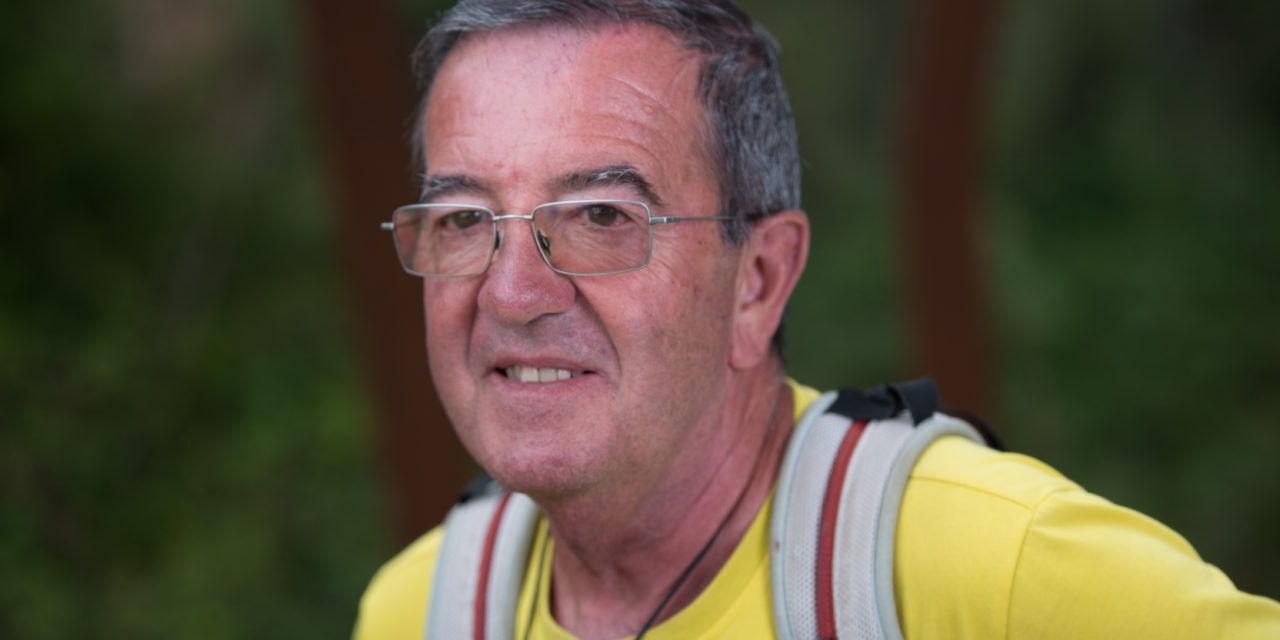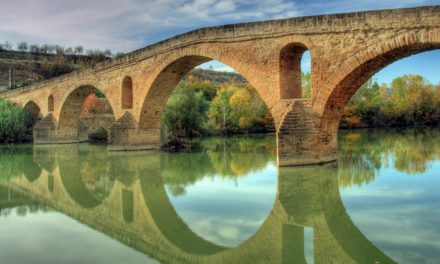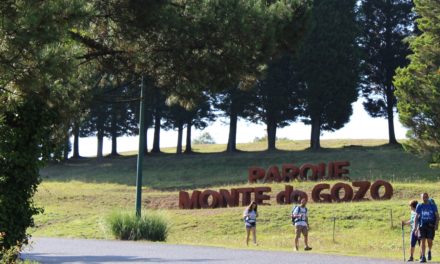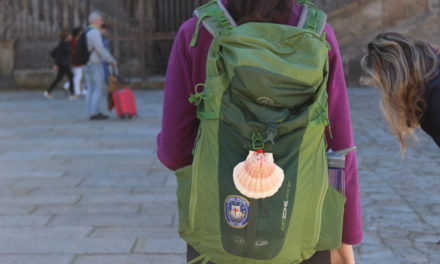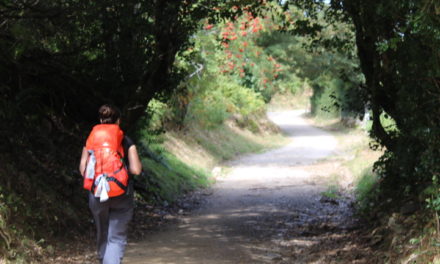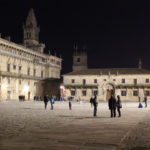Endika Armengol is a pilgrim with more than 70 long-distance Caminos behind him, several books of anecdotes and stories of the Camino and a particular feature that everyone knows: he always wears sandals when he walks. Accustomed to travelling between 4 and 6 ways a year, despite being considered to be in a risk group because of his age, he was one of the first pilgrims to return to the Camino: first in July on the French Way, then in October on the Portuguese Way. We spoke to him to find out how the Camino is nowadays.
– How has your year 2020 been in relation to the Camino?
I had to walk in March and April accompanying small groups but we had to suspend them. As soon as it was possible, I returned to the Camino. That was in July, when I joined the project of “La luz del Camino” from Ponferrada, I couldn’t do it before. It was a project in which several volunteers carried a light backpack in honour of the victims of Covid-19 and it was not possible to do it throughout the entire route. It was very strange, after so many roads, it was the first time that I did not start the French Way in the Pyrenees! Because I always start in Roncesvalles or, above all, in Saint-Jean-Pied-de-Port.
– But then you came back …
Yes, afterwards I returned to the Portuguese Way, I walked from Porto from the end of September until the beginning of October, a solo journey.
– And how is the Camino in these times, Endika?
The experience in July was unusual… When we started, the first shelters had just opened, the Camino we could say, they were the days when the first pilgrims started to leave, they gave themselves, 50 or 60 Compostelas a day. Later they grew, we saw it as we advanced on our Camino and, when we finally arrived in Santiago, between 200 and 300 Compostelas were already being delivered every day.
On that Camino we were a small group, but most of them were volunteers from the area who came to walk a section and then returned home, I continued, sometimes alone, in fact, I remember having slept many nights in shelters practically alone. The day I met more people in the shelters, we were 4 or 5 people.
Now, on the Camino Portugues, things were different. On the one hand, there was a certain normality, open shelters … But reliving the experience of meeting people was not easy, there were few people, the most I found in a shelter were 10 or 12 pilgrims. Another difference compared to July were foreigners, most of the pilgrims that I have met now were foreigners. That was a very important change compared to July, they seemed more than the Spanish: Poles, Portuguese, French and from several English-speaking countries.
– Regarding the measures for the Covid-19 or other aspects, have you perceived differences between Portugal and Spain?
Measures are applied in both territories, what was sometimes uncomfortable for me was that those measures were exaggerated. It did not depend on the territory or the country, simply in some cases the owners of a hostel or a hostel went to one extreme or another. What I can point to as a difference between the two countries is the greater presence of pilgrims in Spain, in Portugal things were sadder … In general, what I missed the most were the dinners and conversations together. Although in July on the French Way, despite the fact that the Camino had just re-opened, the atmosphere was more lively.
– Was there fear among the pilgrims? Is there fear in the community of pilgrims?
There is a lot of fear in society and also in the world of the Camino. My perception is that nationals are more afraid, you see it in the forums, the Spanish ask incessantly about all things: I want to go to such a Camino, on such a date, what do you think? And many people begin to express their opinions and often say that it is better not to go, that it is a risk … In my view it is ridiculous, I have not felt at risk on the Camino. There is more risk in the corner cafe than on the Camino! I say this because with friends in a cafe you relax, but on the Camino we all try to collaborate and comply with the rules; distances are also maintained because, despite the fact that conversations can be very intimate, we are strangers …
Certainly, there are always exceptions- people who break the rules. I remember a hospitalera who spoke to me of her concern about some pilgrims who refused to follow the rules, Spanish pilgrims who demanded that things be as usual. But, luckily, they are the exceptions, not the rule.
Of course, among foreigners I do not perceive as much fear as among Spaniards, nor so many comments about whether or not they should go in the forums: if they can, they come, and that’s it.
Regarding the mask, in many cases the pilgrims appeal to common sense. I mean that if you walk alone or with the people who are part of your small group, your family on the Camino – because with the Covid that has not changed- the family of the the road continues to form as always – in the open air, with all the distance you want … Some people of course relax! But I have always walked with a mask, I wanted to get used to it so as not to have problems with that issue later. I don’t want to limit myself, and if I have to walk with a mask I do it because I want to keep walking.
– Tell me a little more about the hostels …
In Portugal many public shelters were closed, also in Galicia on the Portuguese Way. In general, I found private hostels, also pilgrims’ hostels … The pilgrims are fewer and more dispersed, on the one hand there is no reference to the public hostel and, on the other, those who walk as a couple or two or three friends, many times go directly in search of hostels or hotels. This dispersion makes it more difficult for many pilgrims to meet up in a shelter. This may ensure that sanitary standards are maintained, but at the same time reduces the pilgrimage environment.
In July, something similar happened on the French Way: most of the public hostels were closed and that made it difficult for us to find the same pilgrimage atmosphere as in other years. I understand that public shelters do not open to try to help private initiative, so as not to harm private ones, but their closure excludes many people, especially young people with limited means, such as students … There is great interest in the Camino among young people at this time, also foreigners, and the opening of public shelters would make things easier for them and, moreover, would contribute to re-creating that pilgrimage atmosphere that I have missed. Maybe they should open but with fewer seats, so that at least that option will exist.
-Tell me something more about the feeling of fear, the fear that exists in society and how it affects the Camino? Did you feel safe in the places where you slept or ate?
Yes, I felt safe. In fact, I think that in some places they were too strict. I remember once feeling that I had to work incessantly to do what they asked me to do: put everything in a bag and isolate boots, backpack, money belt …this is exaggerated! In another shelter they sprayed me all over-my body, my belongings … While at other times they didn’t look at anything, although those are the exceptions. I actually think that the minimum precautions are taken by practically everyone.
In my opinion, what is necessary is to standardized procedures. In this way there will be rules that are few and clear and common to all the places where you stay. Thus, they will be learned and followed automatically.
– Anything to comment on about meals? Any difficulty in that sense?
Obviously, with so few people I missed the crowded communal dinners. In the shelters you only could use the microwave, it was the only way you could prepare something hot, you always found someone else using it, but we were few and there was none of the usual family atmosphere. It is simply that the number of pilgrims in the hostels is small.
To eat at noon I never had problems, where I do think one difficulty should be noted is to have breakfast very early. In some places it was difficult to find a bar or cafe that was open so early. It is clear that many cafes it is not worth opening so early for just a few pilgrims and obviously this can create logistical complications for pilgrims. In private hostels you do not always have a kitchen or vending machines … It would be good to guarantee breakfast at some point or that we have more coffee machines and food in hostels.
– Did you feel distrust from the other pilgrims? And from the locals? What memory do you have of your encounter with strangers on the Camino in these times of Covid?
The pilgrims do not distrust one another. They speak and they approach each other just as always. If you walk at the same pace, conversations will naturally between people. In the villages it’s the same thing. I had thought that there would be a rejection, that the local inhabitants would be afraid, but no, not at all, it was rather the opposite: there was a good reception. I think they missed us, sometimes they even leaned out of a window or balcony to shout “good way”. When that happened it was very encouraging.
– If the Covid allows it, will you soon return to the Camino, either alone or accompanying small groups?…
Yes, we are meeting a group from Brazil next April, we will do the French Way, it is one of the trips that we had to postpone. I am in contact with all those people I usually accompany. They ask me for safe accommodation, but they trust me, they trust me and they don’t demand anything particular. They trust the Way.
– What would you recommend or ask the administrations to do?
I compare the Camino with life. It’s the same thing. Every day you can find a reason to get angry with people on the road of life and it’s just the same on the Way of Santiago. So, I quite understand what the difficulties are.
Perhaps I would ask them to try to reach agreements, not to go too far or neglect the rules, to simply look for a series of things that both the public and private spheres have to respect, period.
I would also ask that public shelters be open, especially with young people in mind, at least for Easter it would be important.
And also some thought should be given to breakfast arrangements. And then at least in private hostels, the owners should take into account that at this time it is not easy to find a place to have breakfast and they should offer some possibility, even if it is only through installing machines.
– And the fears that you keep finding expressed on social networks, what do you recommend to those people?
I tell them on these networks that I have made two pilgrimages during this period and nothing happened. You have to respect the regulations at all times and wherever you pass. That is the only problem but you always find solutions. For example, where there are restrictions they are putting on bus services – like the one that was set up in Castilla León to pick up the pilgrims in Mansilla and leave them at the Virgen del Camino. If you follow those rules, nothing happens.
I am of a “high risk” age, in fact, my age goes beyond the so-called ‘high risk’ bracket… And I have never felt that I was taking any risk. Negativity is bad, you get depressed, you become apprehensive … There are many apprehensive people on the social networks, above all because they are influenced by the opinions of others. Ironically, with acquaintances in meetings in closed spaces they trust each other but the Camino with its rules and being outdoors scares them.
I hope that the telling of my experience and spreading it will help … The truth is that hundreds of pilgrims are arriving every day and there are no major incidents, in reality there were no problems. The Camino is very much under control, sometimes too much. And in any case much more than any conventional type of organized holiday.
– And in there anything that you would wish?
Yes, for us to be able to enjoy the Xacobeo in a more natural way, which by now is already possible. This year for me and for many people has been very hard, we miss the Camino a lot, there are people with the terrible Camino monkey on their backs.! But I entertain myself, writing my books on the Camino and preparing my tours … It is the way I have found to continue on the Camino every day!

